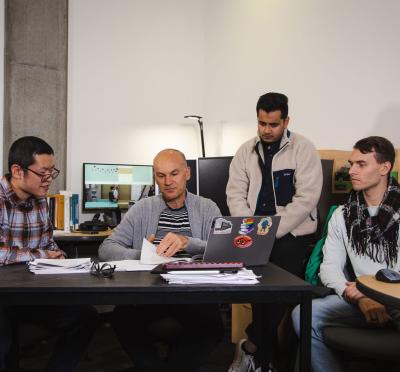In February 2018, when my wife and I first became foster parents for dogs, our motives were partly self-serving. For months, we’d been looking for a puppy to adopt, but demand was so high that we didn’t have any luck. One afternoon I went to SafeHaven Humane Society near Corvallis to ask about their fostering program. Foster parents are given priority if they wish to adopt animals they’ve cared for. Maybe we’d find our puppy while doing some good.
We weren’t entirely new to this. Before moving to Corvallis, I’d been a volunteer at the Atlanta Humane Society, and we had fostered several litters of kittens.
Fostering is vitally important. It frees up space in shelters, which can then accept more animals, and that means more adoptions and more lives saved. Some rescue organizations have no physical facilities and depend entirely on foster homes.

On the day I visited SafeHaven, there were several litters of month-old puppies and their mothers in need of foster care. I snapped a photo of one litter and texted it to my wife to make sure she was ready for this.
A couple of hours later, I brought home Sally, a sweet 2-year-old German shepherd, and her five puppies and set them up in one room of our house. When my wife returned home, she was instantly smitten.
A lot of the caretaking involved cleaning up messes — on the floor, on their paws, on their fur, on our clothes. I shuttled them regularly to and from SafeHaven for vaccinations or for health concerns, such as an assortment of worms that are common in puppies.
We set them loose in the backyard or in the garage, depending on the weather. They played with boundless joy and intensity. They mobbed us, nibbled our ears, gnawed our arms, and pulled our hair. They also dug muddy holes, shredded sections of the baseboard, pulled out chunks of drywall, and scattered and destroyed dozens of trash bags they’d pulled from their box. But it’s impossible to get angry at puppies.
After six weeks, we returned them to SafeHaven. All of them were adopted within 24 hours. We adopted the most rambunctious, headstrong, and confident among them and named him Baloney.
Since then, we’ve fostered dozens of dogs and cats, but none of them as memorable as Mika (pronounced Mee-kah), a gentle German shepherd, and her family.
We picked her up on Dec. 12, 2020. She had already been adopted several weeks earlier, but unbeknownst to anyone she had been pregnant at the time. An ultrasound indicated that she was carrying five or six puppies. On Dec. 19, she gave birth to a litter of nine. The 72 days they stayed with us blurred with activity. Mika needed to be taken out 10 to 12 times every day, so I slept on a futon just outside the enclosure. To wean the puppies, we served them a hand-mixed gloppy gruel several times a day.
Fostering is usually not nearly so demanding. Most of our experiences, especially with kittens and individual dogs, required far less time and energy. As SafeHaven’s foster care coordinator used to tell me, “Puppies are not for the weak.” The work was more than offset by playtime and the wonderment of witnessing them grow, change, and develop distinct personalities within weeks of birth.
My one moment of sheer panic was self-inflicted. Mika’s puppies often followed me around in a line, so one day I decided to lead them into the backyard through the garage door and around the house instead of taking the usual route through the house. As soon as we hit the driveway, they scattered like leaves in the wind. I desperately scrambled to round them up while they dove into bushes, crawled under our car, or gamboled toward the street. I safely corralled them all but never tried that stunt again.
They grew like crazy. On the bittersweet day when we took them all back one last time, a few weighed close to 25 pounds. A healthy Mika was reunited with her human.
Our next litter of puppies led to Lila, our third “foster failure,” the term that applies when when foster parents adopt an animal they’ve been looking after. Lila is an agile blue heeler mix who’s as shy and cautious as Baloney is boisterous and self-assured. They’re a perfect match. (Our second foster failure is Puff, a gray and white male kitten.)
Fostering is one of the most satisfying things I’ve ever done, and shelters are always in need of foster parents. Sometimes it’s a lot of work and other times it’s a breeze, but the rewards are constant.



